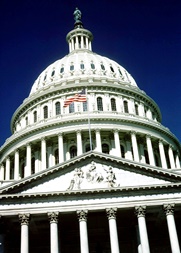 The U.S. House of Representatives was on a week-long recess, which means our delegation was back home and visiting with their constituents around the state. The Senate, however, remained in D.C. working. Both will continue on the job in Washington starting next week until their recess around Memorial Day. A few news and notes:
The U.S. House of Representatives was on a week-long recess, which means our delegation was back home and visiting with their constituents around the state. The Senate, however, remained in D.C. working. Both will continue on the job in Washington starting next week until their recess around Memorial Day. A few news and notes:
* Congressman Larry Bucshon, M.D. (IN-08) held a job fair in Terre Haute on Wednesday in coordination with WorkOne Western Indiana, Indiana State University and the Terre Haute Chamber of Commerce. The event, held at Indiana State University’s Hulman Center, afforded potential employees the opportunity to meet with employers hiring in the Wabash Valley. A special emphasis was given to hiring veterans.
* Bucshon recently attended the Indiana Chamber’s I-69 Regional Summit in downtown Indianapolis. He was fresh from the floor vote in Congress on health care reform and also took time to meet with Chamber executives to discuss the topic.
* Congressman Jim Banks (IN-03), a member of the House Armed Services Committee, issued the following statement on Thursday regarding reports that the Trump Administration is considering sending more American troops to Afghanistan:
“I am glad that President Trump is willing to seriously consider the request of his commanders on the ground, who are asking for additional forces. We’ve been at war in Afghanistan since 2001, but in recent years, decisions about troop levels have been based on politics instead of military strategy. We’ve invested too much blood and treasure in Afghanistan to tolerate a stalemate or defeat. I look forward to learning more about the administration’s plans in the coming days.”
* U.S. Sen. Joe Donnelly has released his Foundation for Families Agenda – a series of policy proposals aimed at improving the quality of life for Hoosier families. Included in the policy agenda:
- Paid family and medical leave
- Expanding access to pre-K and quality childcare options
- Affordable higher education
- Equal pay for women
Donnelly released a video explaining his agenda. He stated, “I am unveiling the Foundation for Families Agenda because we need to ensure our policies and priorities support hardworking Hoosier and American families. When our families succeed, so
does our economy. The foundation for our families should include family leave, options for affordable childcare and pre-K, access to an affordable college education, and the assurance that Hoosier women are paid equally when they do the same job as their male counterparts. These are common sense ideas that I am hopeful we can advance in a bipartisan manner in the Senate.”
* Many news organizations are speculating that a potential candidate to be the new FBI director might be the current president of Anderson University, John Pistole. Pistole is former deputy director of the FBI (and led significant counter-terrorism efforts) and past head of the Transportation Security Administration. He has declined all requests for interviews since the speculation began, but a few friends and family spoke to the Indy Star.
* Indiana Secretary of State Connie Lawson has been tapped to serve on President Trump’s national commission investigating the integrity of American elections; see The Northwest Indiana Times story. Vice President Mike Pence is chairing the commission.


 A brief update on some tech/innovation legislation at the federal level, courtesy of the Chamber Technology Engagement Center.
A brief update on some tech/innovation legislation at the federal level, courtesy of the Chamber Technology Engagement Center.
 The Congressional Budget Office asserts the national Highway Trust Fund would need $3 billion in ADDITIONAL revenue to keep funding transportation projects through the end of September. And it would need $8 billion if Congress chose to extend funding authority until the end of 2015. Read more via
The Congressional Budget Office asserts the national Highway Trust Fund would need $3 billion in ADDITIONAL revenue to keep funding transportation projects through the end of September. And it would need $8 billion if Congress chose to extend funding authority until the end of 2015. Read more via  The U.S. Congress voted last week to provide $10.9 billion to the U.S. Department of Transportation to fund the Highway Trust Fund in order to reimburse states for repairs and infrastructure improvements for roads, rails and airports.
The U.S. Congress voted last week to provide $10.9 billion to the U.S. Department of Transportation to fund the Highway Trust Fund in order to reimburse states for repairs and infrastructure improvements for roads, rails and airports.